
updated 6/20/2022 ⎮ 29 min read ⎮ Marketing Automation
Are you looking for the best marketing automation tools for your small business? Jump straight to the tools sections in this ultimate guide on automated marketing for small business:
- How marketing automation software works
- What marketing automation tools can do (and why you need it)
- Pricing of marketing automation tools
- The 7 best marketing automation tools tips you will read this year
- How to choose the best marketing automation tools for a small business
We've all had those days where we have back-to-back meetings from 9 until 5, yet still have a huge to-do list. Wouldn't it be nice to just sit back and have your marketing be done for you without feeling like it's coming from some robot out in cyberland? Luckily, there's a solution. Marketing automation.
When done right, marketing automation handles what no one else has time for. It's like having an extra employee without needing an extra desk. In this ultimate guide to small business marketing automation, you'll learn how to let marketing automation take care of details, so you can focus on the stuff you love.
Marketing Automation Definition: What Is Marketing Automation?
What does marketing automation mean and how is marketing automation defined?
Marketing automation is the process of using software to automate marketing activities.
Many businesses automate repetitive marketing tasks such as posting on social media, email marketing and even ad campaigns. Not just to be more efficient, but also to provide a more personalized customer experience (CX).
Marketing automation software is designed to help you prioritize and execute your marketing tasks in a more streamlined and efficient way.
But what exactly does that mean for you?
Unlike automating manufacturing processes, implementing a marketing automation system won't make your marketers' jobs irrelevant, it will just make them more effective. It will free up time, while not compromising the authenticity of the content you're creating. It helps you to reach your small business goals faster.
The ultimate goal of marketing is to generate more revenue for your small business by building valuable exchange relationships. Marketing automation helps you to put that on autopilot.
Explore the best marketing automation platform for small businesses.
How Marketing Automation Works: What Is Marketing Automation Software And How Does It Work?
Marketing automation software allows businesses to optimize their digital marketing strategy by automating marketing tasks such as email marketing, social media posts, and lead generation.
The automation of these tasks is possible because of a workflow you can create and fully customize. A marketing automation workflow is the path that triggers one task after another that the software executes.
An example of this would be when a new customer creates an account on your website, which triggers a welcome email to be sent out to them, and other actions follow after that.
Each step in the workflow is prompted automatically by a previous step by the marketing automation software, so you don't have to do each step manually. The workflow can then be shaped around any marketing task. All you have to do manually is update, optimize and tweak the workflow based on the data and insights the software gives you.
Get started with marketing automation today. Start your free ActiveCampaign trial.
What Marketing Automation Tools Can Do (And Why You Need It)
Small business marketing automation software can do a lot of heavy lifting. It can handle anything from the small, repetitive 1-minute-tasks to turning your entire small business into an automated small business. There are a variety of features marketing automation small business tools can do, and you need because no one else has time for it.
- Get complete control of your digital marketing campaigns
- Get a canvas to design your own campaign types
- Send automated and customized messages to users
- Enjoy seamless integrations with hundreds of your favorite tools
- Gain actionable insights to improve your digital marketing campaigns
- Get real-time results tracking, insights, analytics, and behavior automation
- Do A/B testing to generate more leads
- Improve your audience segmentation
- Create powerful automated workflows
- Build dynamic sign-up forms to help grow your list
- Get landing page templates dedicated to each campaign
- Get live chat and conversational bots
- Enjoy automated lead scoring
Pricing Of Marketing Automation Tools
Marketing automation tools for small businesses offer multiple plans starting from $9, and some tools cost up to $3200 per month when billed anually, depending on the services you use. You can choose to pay monthly too if you wish to do so.
Get started with marketing automation today. ActiveCampaign offers a free 14-day trial and has the most automation possibilities and features. Their pricing is a great value for the cost as well. Start your free ActiveCampaign trial.
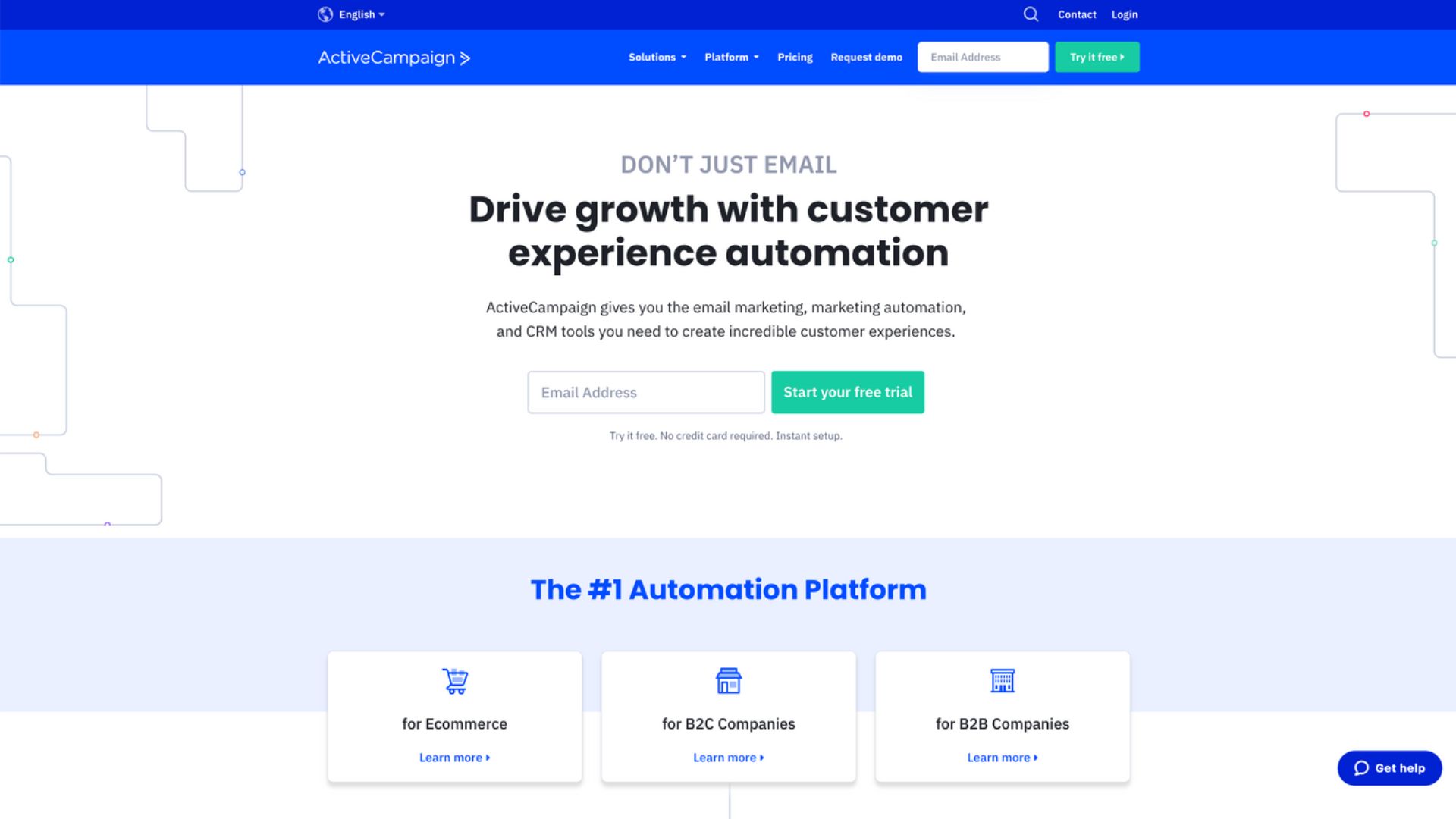
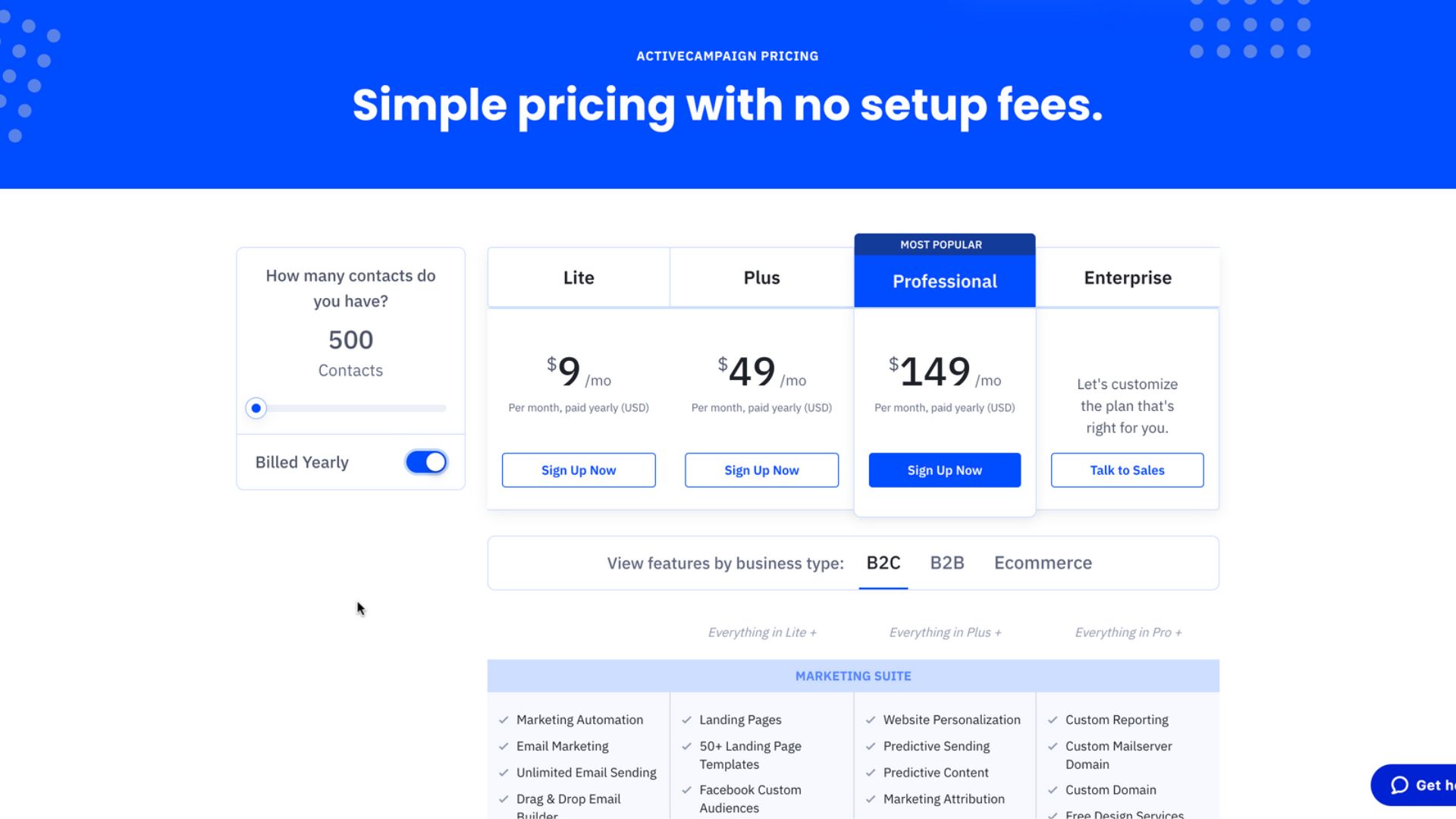
The 7 Best Marketing Automation Tools Tips You Will Read This Year
For small businesses, marketing automation can be a blessing. With restricted time, money, and team members, automating routine activities and processes helps the small business to achieve better marketing outcomes by doing more with less. Even all-in-one robots, however, need some assistance to complete their tasks. If you want to improve your branding on social media, you can make use of certain automation tools. You can also check out the Hootsuite mobile features.
Small business owners need to make sure they're getting the most out of marketing automation, and it's a good idea to take a step back and look at what other people have learned along the way. As a small business just getting started with marketing automation, you can define your goals and set a set of measurable targets that will eventually form how your campaigns are planned.
Consider what you're trying to do with marketing automation when setting these objectives. Marketing automation is used by most small companies to improve e-commerce revenue, lead generation, customer retention, and repeat business. To make it easier for you, we've gathered some of the best small business marketing automation tips from around the internet in this article.
💡 Marketing Automation Tools Tip 1: Prioritize Based On Strategy
It's impossible to get the most out of your marketing automation program, if you don't know what you're trying to accomplish. At every stage of the process, from selecting the right tools to monitoring and analysing the customer data, having a consistent plan is crucial. You'll be better able to steer the marketing automation in the right direction if you know what you're looking for.
💡 Marketing Automation Tools Tip 2: Critically Select The Marketing Automation Software
Keep in mind that, while there are many excellent options available, not all of them are appropriate for your business. Spend time testing marketing automation software so you can make the best decision possible.
Don't be afraid to question vendors about the features that matter most to your company, such as data integration capabilities with other software and the platform's strengths and weaknesses.
💡 Marketing Automation Tools Tip 3: Build Your Contact List Organically
If you want your list to be successful, it must be populated with eligible leads. Although it might be tempting to purchase a contact list to get an immediate boost in engagement, there's no point in doing so if the leads aren't interested in what you're offering.
Create compelling landing pages and a strong digital ad and social media strategy to develop your email marketing list organically. Make sure that your drip campaigns, email outreaches, and follow-ups are only sent to people who are engrossed in your services.
💡 Marketing Automation Tools Tip 4: Agile Thinking: Begin with one or two processes and work your way up
Rather than attempting to set up everything at once, begin with one or two processes and work your way up. The agile marketing approach is based on data rather than assumptions. You build marketing campaigns that are more likely to drive conversions and interaction by implementing a limited number of tactics and then monitoring the data for actionable insights, and you avoid some of the common mistakes that you would otherwise end up making from campaign to campaign. This method is more effective, and it will ensure that the marketing campaign is carried out.
💡 Marketing Automation Tools Tip 5: Create Buyer Personas
Buyer personas are a response to the current marketing dilemma of wanting to speak to each customer individually but not having the time to do so. Try to be as precise as possible when creating yours, recognizing not just the main demographics of certain types of consumers but also their pain points, attitudes, and goals.
This will assist the sales team in determining who they can target in their outreach. If you need some inspiration, a quick Google search will yield some results. Building out these personas might aid your SEO and content marketing efforts by identifying keywords that your target audience could use while searching online.
💡 Marketing Automation Tools Tip 6: Provide Training
If you have a five-person marketing team, a two-person marketing team, or just yourself, it's critical that you have training on how to use the platform you've implemented.
Also, the most advanced marketing automation tools can be difficult to use. You'll probably end up misusing or overlooking main features if you don't get a comprehensive rundown of what you're dealing with. Almost all vendors have real-time training, so inquire with your sales representative about getting started.
💡 Marketing Automation Tools Tip 7: Improve The Quality Of Your Content
When it comes to disseminating content, marketing automation will outperform your standards, but it can't build it for you. You'll still need to prepare, develop, and refine the content you send to your leads through email marketing, with a focus on quality and uniqueness.
Not only can the marketing automation tool provide you with more advantages, but it will also result in more conversions. Since you'll be using this material often in your lead nurturing outreach, make it educational. Build long-form content that can be quickly promoted and is gated on a landing page. Gating the content protects your most important content so that it can be used to generate leads.
How Do I Choose The Best Marketing Automation Tools For A Small Business?
This is how to choose a marketing automation platform for small businesses.
To find the best marketing automation systems for your small business, you need to know the outcomes you want to achieve and be clear on your goals. Focus on the long-term business results you want to achieve instead of product features. Then do a marketing automation platform comparison for marketing automation software for small businesses to determine the best marketing automation software for your small business.
If you're looking for a marketing automation software that was built with the needs of small businesses in mind, we recommend you check out ActiveCampaign.
There is a resource dedicated to allowing you to compare how ActiveCampaign stacks up against other marketing automation tools. View the ActiveCampaign feature comparison.
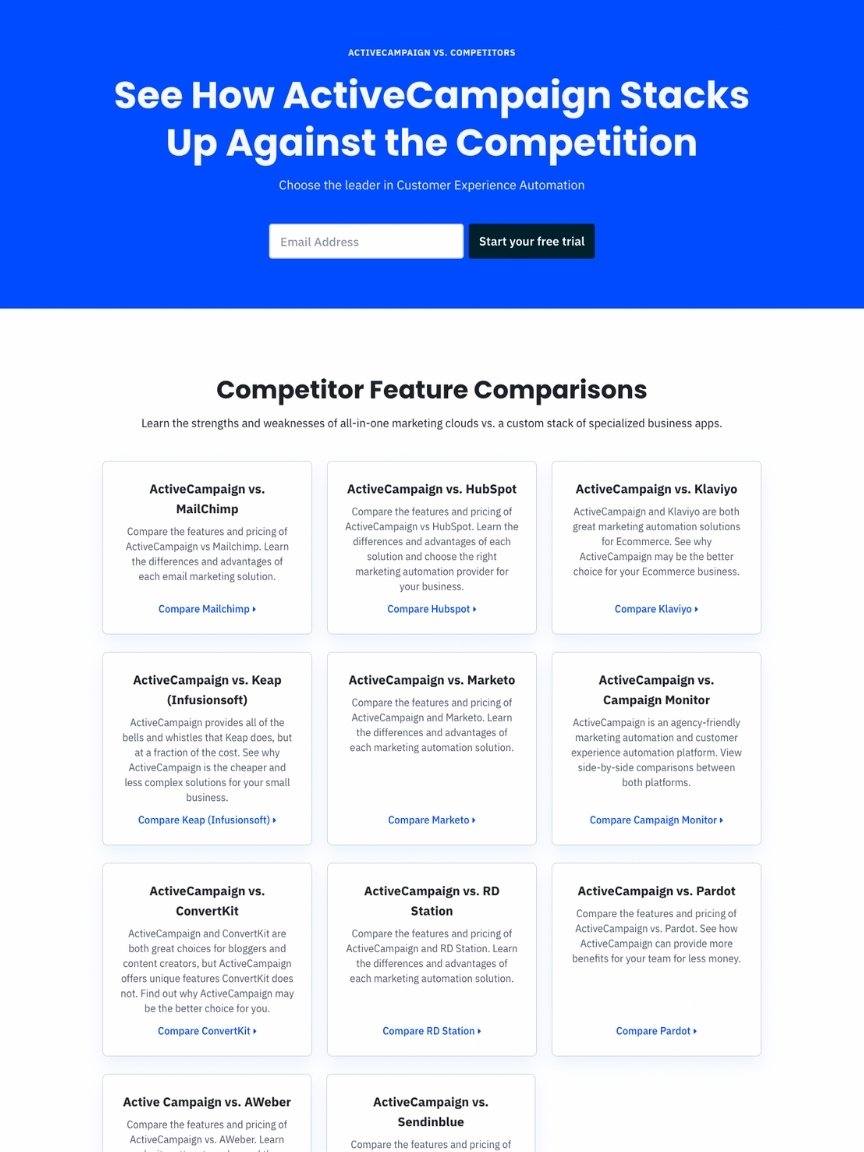
Why Use Marketing Automation? Why Is Marketing Automation Important? What Are The Marketing Automation Benefits?
Among the benefits of marketing automation are that it can help small businesses to:
- Improved targeting of messages
- Improved customer experience (CX)
- Better quality of leads
- Getting more leads
- Improved efficiency and ROI in marketing
- Higher conversion
- Closer cooperation between marketing and sales
- Cost efficiency
- Ability to combine data from different channels
- Increase web traffic
- Better profit
- Shortened sales cycles
- Freed up time and resources
- Not having to do repetitive tasks manually
- Get analytics, data and intelligence
- Deepen your knowledge
- Focus on strategy
- Get a rich, detailed picture of the behaviour of potential customers
- Scale your small business
- Customize and personalize messages and campaigns
- Never have to remember to follow-up again
- Cross-sell and upsell
- Deploy wider marketing campaigns
- Prioritize leads, nurture, score and segment them
- Improve your marketing ROI
- Higher revenue and profit
- Faster business growth
- Lower costs than an employee
- Deliver better targeted and measurably more effective campaigns
- Predict future investments more accurately
- Collect customer reviews
This all is amazing and exactly what we want as business owners. Marketing automation can make our dreams a reality. So, what's keeping so many people from deploying marketing automation in their small business? It's not knowing how to properly implement the marketing automation technology and integrate it with the processes and systems already in place. Which is okay. It's not an excuse. That's what a digital marketing expert is there for.
You are not alone if you struggle to align your people, processes, and technology to achieve your digital marketing goals. It's time to get help from a marketing automation agency like Dragon Digital Marketing to help you with implementing marketing automation.
Marketing automation is one of the fastest-growing technologies out there, according to Forrester's Marketing Automation Technology Forecast, 2017 to 2023. It was initially only used and affordable for large enterprises, but now marketing automation is available to small businesses on a budget, too. Tools for marketing automation have become more prevalent. No wonder marketing automation is no longer a nice-to-have – it's a must-have for any small business to keep up.
Explore the best marketing automation platform for small businesses.
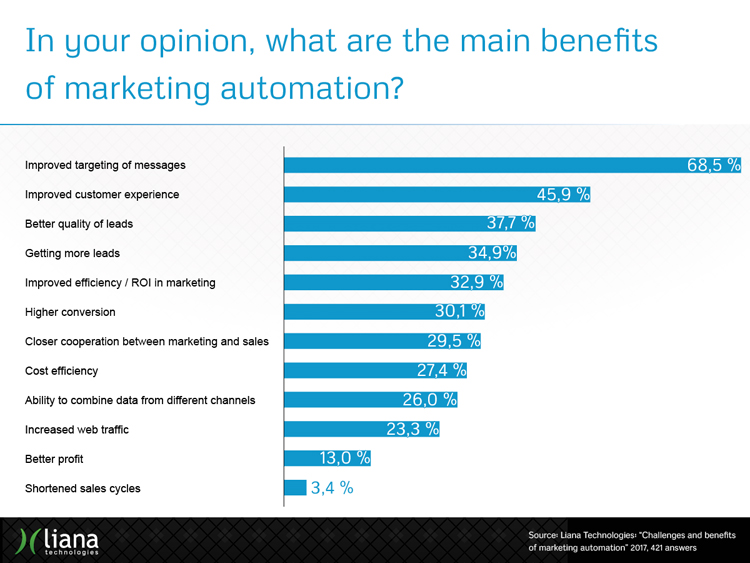
Where Can You Apply Marketing Automation In A Small Business?
Marketing automation is a great way of guiding potential customers through your social channels, email, website and your entire customer experience. It can help you to generate new leads, convert existing leads and nurture your customers to turn them into advocates and evangelists of your brand.
The applications of marketing automation for small businesses include:
- Social Media Marketing
- Content Creation
- Email Marketing
- Lead Generation
- Lead Nurturing
- Metrics and Analytics
- Management Activities
- Document Management
- Workflow Management
Marketing automation should work in your small business like parts that click together like a well-oiled machine.
A good marketing automation software has these 9 marketing automation features:
1. Site tracking:
What are people doing on your website? Track actions on your site, then follow up
with triggered messages.
2. Sign-up forms:
Collect email addresses, segment your audience, and trigger automations with custom
forms.
3. Migration services:
We'll migrate your automations, emails, forms, and contacts to ActiveCampaign for free.
4. Goal tracking:
Track goals and conversions to see what's working and what isn't in your
marketing.
5. Advanced reporting:
Figure out which marketing gets results. Use advanced reports to find ways to
grow.
6. Attribution tracking:
Track the entire customer lifecycle to see where your customers come from.
7. Split action:
Find your top performing automations by testing your automations and email funnels
against each other.
8. Lead scoring:
Find your most engaged contacts and offer them exactly what they want.
9. Notification emails:
Let automation nurture your leads, then notify you at the perfect moment to follow
up.
You can also make your entire office smarter with automation. SmartOffice Technology caters for the growing requirements of document automation and workflow solutions within the modern office. Effective automation software has become critical to thriving in business.
There is so much potential to grow and scale your small business with marketing automation! Dragon Digital Marketing helps you to overcome the challenges to marketing automation and does all the heavy lifting for you.
Get started with marketing automation today. Start your free trial.

Marketing Automation Challenges
Data from research shows that the top marketing automation challenges (Source: SmartInsights & GetResponse) are:
- Securing budget
- Quality of customer data
- Knowledge to set up different types of automation (e.g. rules, lead scoring)
- Producing engaging content and communication
- Measuring effectiveness
- Understanding and choosing the technology needed
- Lack of knowledge and skills of internal teams
- Integrating with other existing systems
- Lack of buy-in and vision from senior managers

Moreover, research shows that the top marketing challenges to marketing automation (Source: Gleanster) are:
- Data quality and integration
- Creating enough content at a reasonable cost
- Poor marketing processes
- Lack of skilled staff
- Selecting metrics
- Organizational structure
- Senior management mindset
- Lack of IT support
- Lack of funding

The marketing automation challenges report shows that the top marketing automation challenges (Source: Automizy) are:
- Creating automations
- Integrations
- Complexity
- Creating content
- Engagement
- Segmentation
- Data management
- Optimization
- Finding tools
- Personalization
- Lead scoring
- Analytics
- Reporting
- Deliverability
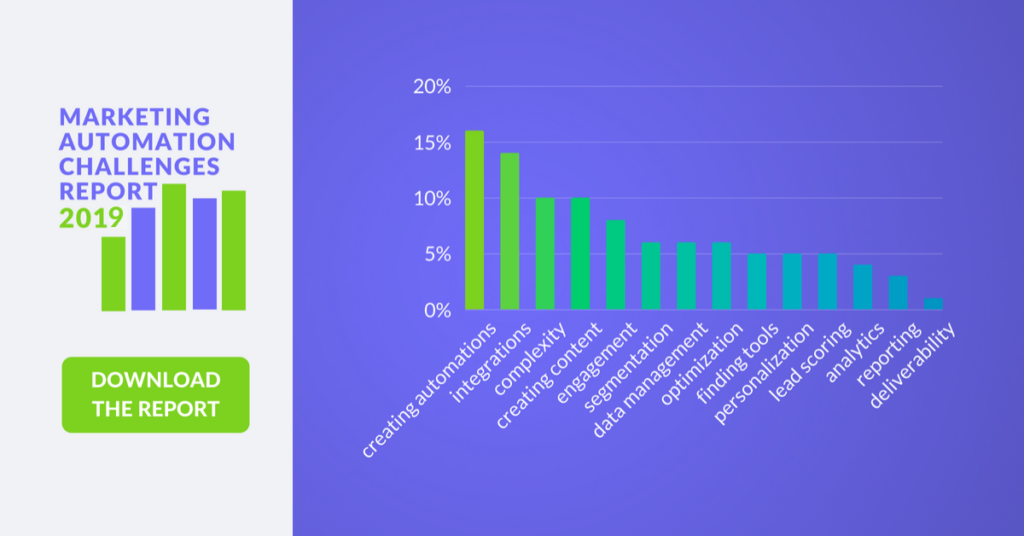
What Are The Main Reasons Why Businesses Haven't Started With Marketing Automation Yet?
Here are the top reasons why businesses haven't started with marketing automation (Source: Liana Technologies):
- Lack of expertise and know-how
- Lack of human resources
- Lack of marketing automation strategy
- Lack of financial resources
- Insufficient customer data
- Lack of appropriate content
- Company's poor commitment
- Other technical difficulties
- Falling behind schedule
- Usability issues and difficulty to use systems
- Introduction of systems taes too much time
- Lack of suitable partners
Getting started with marketing automation is a lot faster than you might think. Try it out for free for your business today.

How Do You Make Marketing Automation Work?
Marketing automation is powerful. But to fully leverage it, you have to know how to automate marketing.
Look at this Salesforce infographic showing how marketing automation works and how to do marketing automation.

How To Use Marketing Automation & How To Implement Marketing Automation
10 questions to ask yourself when determining which processes to automate in your business:
- Is this process required?
- Is this process repetitive?
- Is this process profitable?
- Is this process rule-based?
- Does this process have readable inputs in the form of structured data? (e.g. spreadsheet, ERP application, trackable activity or action, etc.)
- Is this process mature and stable? (i.e. process and capability don't change frequently)
- How high are the volume and frequency of this process?
- Which softwares, humans, and integration points are involved in this process?
- What measurable wins and gains are there when you automate this process?
- Who is the primary beneficiary of automating this process – your customers or you?
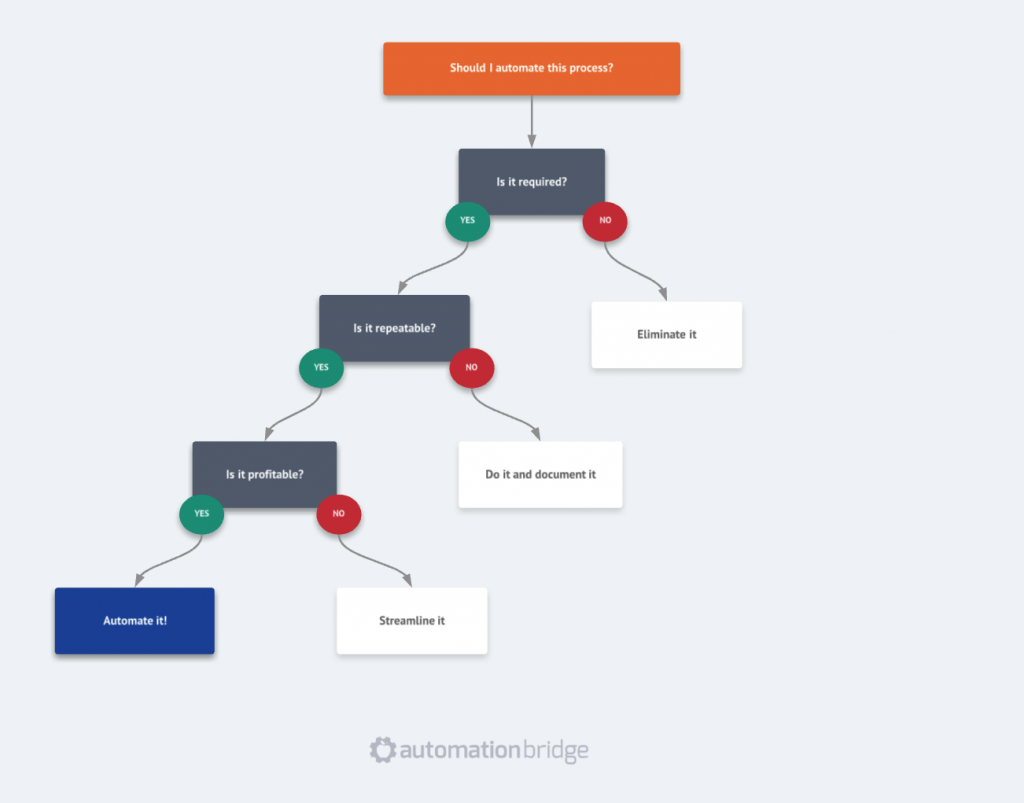
Getting your marketing automation going can be achieved in 5 simple steps:
Step 1: Set your goals.
To get started, you need to think about your goals and how you will achieve them. Determine what you want marketing automation to help you do.
Step 2: Make your plan.
Lay out exactly what you're looking for and what you're trying to accomplish. Make a list of needs and wants and see which solution matches the most essential criteria. Ensure cross-functional alignment because marketing and sales need to work together in order to deliver results. Also make sure that the marketing automation platform of your choice seamlessly integrates with other softwares you're using.
Step 3: Implement your plan.
Once you have chosen the marketing automation platform, figure out who on the team needs to use it and who will implement your marketing automation strategy in the system. Someone needs to be the owner of the marketing automation technology, keep it updated and be the contact person for questions. The right marketing automation solution helps unite all the people, tools, systems and processes on your marketing and sales team. It should integrate with your contact relationship management (CRM) system and all other related workflows.
Step 4: Measure your results.
Reporting and analytics help you prove the impact of your marketing efforts, making sure you measure all necessary data, account engagement, and the combined impact of sales and marketing activity. Understand which marketing automation KPIs (Key Performance Indicators) are the most important to track, and which areas of marketing provide the best ROI.
Step 5: Continuously optimize.
Once data starts coming in, you will have the opportunity to tweak your automations for better results. You should know your audience and what works for them.
Explore the best marketing automation platform for small businesses.
5 Common Problems That Marketing Automation Can Solve
Problem 1: You need to do more with less.
You need to generate more leads, grow your revenue and close deals faster. You're busy all the time and once one task is finished, another follows immediately. Marketing automation frees up your busy schedule. It allows you to automated tasks, so you can focus on more strategic work and let the software do the rest.
Problem 2: You don't know how to track or optimize user engagement.
Tracking your user engagement and activity is essential. Automation allows you to capture, track, manage and score leads that come in the marketing automation funnel. You can also automate marketing processes and conversations across various channels and put the tracking and managing on autopilot.
With this marketing intelligence, you'll be able to better optimize and demonstrate the ROI of your marketing efforts. Marketing automation provides an easier way to provide the right content to the right person on the right platform, where they are open to engaging with you and even retarget them.
Problem 3: Your leads aren't converting or you have a leaky marketing funnel.
This is frustrating but it can be fixed. Marketing automation allows you to nurture prospects with relevant and useful information across multiple channels until they are ready to buy. This way you can turn your leads from information-qualified to marketing-qualified to sales-qualified all automatically. You'll end up getting more sales and a cheaper cost per lead.
Problem 4: Your leads aren't qualified.
You can't just focus on top-of-funnel brand awareness building and lead generation. You also need to make sure your leads become sales-qualified and are a good fit for your small business. There's no point in generating more information and marketing-qualified leads when the leads have no possibility of converting into sales.
Marketing automation helps you to better understand your leads. You will be able to personalize each individual person's buyer journey from the first touch point to the sale and beyond. You'll get marketing data and analytics about your prospects and leads and can also use your marketing automation systems to score and nurture leads.
Problem 5: You're experiencing marketing inefficiencies and technology gaps.
Marketing automation makes your small business marketing more efficient. It allows you to automate certain workflows and you and your team are free to focus on more strategic work that will help to improve overall processes, innovate and tweak your marketing campaigns and boost your bottom line. The right marketing automation workflow of your communication, e.g. email marketing and mobile marketing through text messages, makes sending targeted messages that are highly relevant in a timely manner easy to achieve.
Try the best marketing automation software for small businesses for free.
Why Does Marketing Automation Fail?
Marketing automation can fail for a variety of reasons. The biggest reason marketing automation fails is because a business has no foundation for it.
If a business automates tasks that are not proven to work, marketing automation fails. Marketing automation helps you to scale what already works and grow your business faster. If you do tasks that don't work at a larger scale, it won't magically make them work all of a sudden.
Don't invest in marketing automation before you have fertile ground for your campaigns to blossom. A digital marketing consultant can help you with determining that for your business.
Make sure you work on your lead generation first and you have a steady flow of leads coming in that you segment based on their interests in your CRM.
"If you don't have inbound lead generation strategies figured out for
your small business yet and you spend your time figuring out how to squeeze more out of the tiny
fraction of the market you already have in your database, you are more likely to fail because the
competition is taking the approach of firstly figuring out how to get more out of the 99.99% of the market
that's still out there."
– Monique Idemudia
Now:
We've learned that a relatively large database is required to fully leverage marketing automation so it has a significant effect on your bottom line. However, this does not mean that you should go out and buy large lists of contacts to nurture with marketing automation. This is another big reason why marketing automation fails.
This spammy tactic produces an incredibly low return on investment (ROI). Along with the cost of buying these lists, sending unsolicited emails to people who have never requested any information from you leads to low engagement and hurts your IP address reputation, and lowers your email deliverability rates.
According to ActiveCampaign, the leader in small business marketing automation, an additional 6 common reasons why marketing automation fails are:
- Lack of human touch and sounding like a machine
- No top-of-funnel growth and neglecting awareness and lead generation
- Messages that are the same for everyone
- Messages sent at the wrong time
- Limiting the messages to emails
- Neglecting content marketing
8 Dangerous Myths Of Marketing Automation And How You Can Avoid Them For Success
When we consider that the global marketing automation market size is expected to reach USD 8.42 billion by 2027, and that it is expanding at a compound annual growth rate (CAGR) of 9.8% from 2020 to 2027, according to a new study conducted by Grand View Research, Inc., it is clear that your business should be taking advantage of it.
When you do, you shouldn't fall for these ten marketing automation myths and mistakes.
Myth 1: "Marketing Automation Isn't Required Or Necessary"
Believe it or not, 55.6% of businesses have yet to adopt marketing automation due to a lack of knowledge.
However, we also need to look at the other side of the coin. 76% of businesses that choose to implement automation experience a higher ROI within the first year. A further 74% claim that they are also able to save more time when tackling other in-house tasks.
Marketing automation is very necessary and required to maintain a competitive advantage in the long-term because businesses that won't implement it won't be able to keep up and fall behind.
Myth 2: "Marketing Automation Only Benefits Larger Firms, Not Small Businesses"
Another myth that needs to be busted involves the belief that marketing automation only benefits larger organisations. It is just as valuable for smaller businesses that hope to rise their head and shoulders above the competition. Statistics once again back up this observation.
Half of all small businesses which participated in a recent survey said that they experienced an uptick in sales and nearly 70% observed that they enjoyed higher rates of client engagement after implementing marketing automation. We can now see that marketing automation is suited for companies of all sizes.
Myth 3: "Marketing Automation Involves Only Emails And Sending Autoresponders"
Technology has come a long way in recent years. There are many ways to generate leads and nurture and convert them. Marketing automation can be applied to your:
- Social media campaigns
- Customer relationship management system (CRM)
- Text message marketing
- Tracking the entire sales pipeline
- Creating quality written content
- Developing tailor-made marketing campaigns that resonate with a specific audience
Although automated email marketing will certainly come in handy, there are many other options at your disposal.
Myth 4: "Marketing Automation Is Impersonal And Robotic"
The term 'automation' is often associated with rather robotic concepts. When we consider that marketing automation can represent a repetitive process, it is easy to see why some feel that it does not offer the level of personalisation that more hands-on marketing techniques provide.
The truth is that when marketing automation feels impersonal and robotic, this isn't the fault of marketing automation – this is the fault of bad marketers who decided to go with empty quantity instead of high quality.
The good news is that times have changed. Your automated marketing messages don't have to sound like you're talking to a wall.
You can even tap into valuable insights about each contact's activity and engagement and use that information to dynamically personalize your automated messages. The result is a higher ROI and naturally a more rewarding customer experience.
Myth 5: "Marketing Automation Essentially Runs On Its Own And Is A Set-It-And-Forget-It Thing"
It is easy to forgive those who believe that marketing automation is a hands-off approach. After all, the phrase suggests that it means putting your marketing on autopilot and being able to set it up and forget it.
This is another dangerous myth.
Although marketing automation can do repetitive and time-consuming tasks, such as data entry and follow-ups, it is by no means a standalone system. It is instead wise to view marketing automation as an ever-evolving process.
Marketing automation needs constant care and awareness for it to work effectively. It works as a supplement and is not meant as something you can set and forget.
Myth 6: "Marketing Automation Is Only Relevant For Email Marketing"
Many small business owners think marketing automation is only relevant for email marketing.
As we explained above, there are many other channels where marketing automation can be applied and is relevant. While email marketing is certainly one of the stronger channels for automation, it can be utilized with social media, landing pages, lead generation activities, management activities, and much more.
When you realize the benefits that marketing automation can add to other marketing channels, you’re well on your way to saving your small business time and money.
Myth 7: "Using Marketing Automation Is Being Lazy"
Many people believe marketing automation is a lazy way of tackling your content publishing or email campaigns. And marketing automation can indeed be 'lazy' when used as the easy way out.
Auto-generated and robotic-sounding blog posts, bot-generated headlines that are just weird, unpopulated personalization fields in emails that read like "Hello Mr. {%Last Name%}, We would love to help you grow {%Business%}.", sentences that are grammatically incorrect or make no semantic sense whatsoever,... The list goes on. These are all examples of lazy automation.
Quality marketing automation on the other hand takes work, and it's well worth your effort in the end. Quality automation isn't finished once you send it. You don't have the ability to sit back and relax because, in reality, marketing automation is only one piece to a much larger marketing strategy.
You need to be aware of what you're saying at all times, across all channels, and how your scheduled content could affect your small business if it's left unmonitored or unchecked.
Myth 8: "Marketing Automation Is All Spam, No Glam"
Another dangerous myth is that marketing automation is just a different form of spam.
Some companies may choose to automate their marketing in this fashion, but it doesn't mean that you can't do it differently.
Spam can be spam because it's unsolicited. But spam can also be spam because of its irrelevancy. If your content isn't resonating with your audience in a personal way, it probably wasn't worth the 'send' to begin with.
With marketing automation, you can trickle information and content down to your audience members based on who they are, what they like, and how they found your business. It's an opportunity to engage conversationally while guiding your prospects through your marketing funnel.
Marketing Automation Best Practices: The Dos And Don'ts Of Marketing Automation
We want to give you a few tips for implementing marketing automation for your small business to make sure it will be a success for you.
10 Dos of marketing automation for small businesses:
- Do know your digital marketing goals.
- Do figure out all the repetitive manual tasks you want to automate and be clear about the systems and processes in your business.
- Do combine your automation strategies with ongoing marketing campaigns.
- Do take advantage of the targeting and segmentation options in the automation tool. This will help you reach a very targeted audience segment that is looking for a specific type of content.
- Do share valuable content regularly to build trust.
- Do focus on customer retention.
- Do focus on building a solid and marketing automation funnel and keep your messaging authentic and straightforward.
- Do integrate marketing automation with your digital marketing strategy.
- Do send highly-targeted and specific content to a narrowed audience.
- Do set up customer engagement campaigns to keep your current customers happy and coming back for more.
10 Don'ts of marketing automation for small businesses:
- Don't set unrealistic goals and never expect overnight results.
- Don't rely entirely on your tools for marketing automation. Marketing automation is there to scale your marketing efforts, not replace them.
- Don't focus completely on acquiring new leads. Nurture your existing customers as well.
- Don't depend on automation tools to create content for your business. The tools can be used in much better ways to bring in much better results.
- Don't be salesy with your marketing tone. You don't want your messages to look like commercial mass email blasts that you send to everybody at once.
- Don't assume that expensive marketing automation services and softwares will always be better than the more affordable ones.
- Don't just blast or broadcast general messages. Make use of marketing automation trends like personalization.
- Don't abuse the personalization option to the point where you sound like a creepy stalker.
- Don't neglect human interaction and replace it with automation. Remind people that there are real people like them behind your content.
- Don't allow your digital marketing to become rigid.
Try the best marketing automation software for small businesses for free.
Marketing Automation Best Practices: What Does "Good" or "Bad" Marketing Automation Look Like?
What bad marketing automation looks like:
"Bad" marketing automation, in our opinion, is doing marketing automation in the old, traditional way and not leveraging the new opportunities that modern marketing automation brings.
It's not necessarily bad for your business but it means that it could be better, and chances are that your competitors are making better use of marketing automation, which makes their marketing automation better and causes you to be 'worse' off in comparison.
Using marketing automation in the traditional way means triggering emails based on time delays or actions like email opens, clicks throughs, or webpage visits. But that alone is just not enough data to execute a personalized lead nurturing strategy.
Marketing automation strategies that offer limited data like this often result in "bad" marketing automation. You need more. You need context about who your leads are and what they're interested in to give prospects a good experience.
What good marketing automation looks like:
Good marketing automation, in our opinion, is backed by an inbound marketing strategy. Inbound marketing is centered around the prospect and drawing them in organically with great content they want to consume. Inbound marketing automation uses all the information we know about a person to drive the marketing automation strategy. With inbound digital marketing, you can deliver the information they need to make a purchase, exactly when they need that information, in the place they're looking for it.
When you track custom events and see what types of content a person consumes, what their top content categories are, what their main interests are, and what they care less about, you can build much more powerful automations.
Good marketing automation takes into account the evolving needs of your leads, and the behaviors and interactions they have with you across all of your marketing channels. Not just email. Using behavioral inputs from multiple channels such as social media, viewing a pricing page, or consuming a particular piece of content gives you the context you need to fully understand your buyer persona's challenges.
The most effective way to use marketing automation in your small business is to capture information continuously along the various channels your buyers journey includes and to use that information in your marketing campaigns, so that the success of your marketing campaigns relies less on the email, and fully utilizes the various channels that influence a buyer's decision.
– Monique Idemudia
Try the best marketing automation software for small businesses for free.
Marketing Automation For B2B
Marketing automation is very well-suited for B2B.
Because B2B sales cycles tend to be longer, decisions are more complex and the stakes are higher, there is a larger need for lead nurturing, lead scoring and tracking the engagement and interactions. Staying front of mind with personalized and targeted content and communicating more and more benefits and advantages of your solutions in automated drip campaigns can take your marketing success to the next level.
Because B2B marketing deals with more complex multi-stage procurement processes and is highly relationship driven, building brand awareness is vital.
You can use marketing automation to nurture leads along the buyer's journey - over weeks, months, or even years - deal with objections, address the needs and concerns of each person involved in the decision, and make it obsolete for your lead to do any more research on their own. All while staying top of mind.
With marketing automation you can send the right messages to the right person at the optimal time - and scale it - until a person is ready to talk to a salesperson and ready to buy, all on autopilot.
Try the best marketing automation software for small businesses for free.
Marketing Automation For B2C
Marketing automation is great for B2C.
In B2C marketing, it is important to make consumers familiar with your business, brand, product or service. You want to give them a compelling reason to buy. You can use marketing automation to nurture your leads, entertain, inspire, educate and convince them to buy in a shorter time frame.
Marketing automation helps you to track your lead's behavior and collect information over the duration of the buyer's journey, you canuse to further personalize your messaging and marketing campaigns.
Automation also gives you the possibility to allow people to get to know you better, build likability and establish trust. This takes multiple touch points to achieve and it saves you a lot of time if you put it on autopilot. Imagine how you could present each customer with the right offers you know they like based on theri past purchases with marketing automation for ecommerce.
Try the best marketing automation software for small businesses for free.
When Is The Right Time To Invest In Marketing Automation?
Only you can decide when the right time is to invest in marketing automation for your small business. Tools for marketing automation and softwares can be fascinating from a distance but are meant to help you scale your small business.
Some people may want to influence you to use high-end expensive marketing automation software, but when you're just looking to get started you can take a step back and start with a simple and easy-to-use marketing automation software for small businesses like ActiveCampaign.
There are some good signs that marketing automation will work for your small business that you can look for upfront.
Here is a checklist to consider before jumping into marketing automation:
- ☑️ I have a solid content marketing strategy for my business.
- ☑️ I am clear about my target audience, know their burning problems and have buyer personas.
- ☑️ I know how to help my audience solve their problems with the high-quality content I share on digital platforms.
- ☑️ I have clear business goals and a strategic marketing plan mapped to my buyer's journey.
- ☑️ I have experimented and innovated my marketing methods before.
- ☑️ I am currently not stagnant in my business growth and know that doing the wrong things that don't work on a small scale won't work any better on a large scale. I want to automate and scale things that work.
- ☑️ I am getting new qualified leads consistently and I'm no longer able to handle them manually.
- ☑️ I know my audience's why and have a lead nurturing strategy.
- ☑️ I am tracking my customers, leads and contacts behavior and want to make the process more efficient.
- ☑️ I know what I am doing and can understand and correctly use the marketing automation tool I am signing up for. No need to crack a nut with a sledgehammer.
Keep in mind that marketing automation will not market your business for you - it helps you to scale your small business marketing efforts.
Try the best marketing automation software for small businesses for free.
What's The Difference Between Marketing Automation And CRM?
A Contact Relationship Management (CRM) system and marketing automation platform go hand in hand. Their roles and functions are connected and overlap.
This is how your CRM and your marketing automation tool complement each other. Your CRM is what maintains a consistent, detailed profile of each individual along your buyers journey – from contact to lead to prospect to customer. The marketing automation part is what listens for events and triggers like behaviors and whenever it registers something, it performs the actions you tell it to perform in the automations that you build. In order for marketing automation to work, it needs the database of contacts that are stored in a CRM.
The performance data of your marketing automation campaigns in your CRM gives you more data to work with and use for your future marketing automation campaigns and so the cycle of the two tools working hand-in-hand repeats.
Typically you buy a CRM with marketing automation since they both come together in one tool as a 'marketing automation CRM'.
Try the best marketing automation software for small businesses for free.
Marketing Automation Statistics
The marketing automation industry is growing and has become one of the most important trend in digital marketing. According to recent studies, marketing automation on average drives upto 14.5% increase in sales productivity and a 12.2% reduction in marketing overhead. 80% of marketing automation users saw an increase in the number of leads using marketing automation software, and 77% had an increase of conversions. 91% of marketing automation users agree it is "very important" to the overall success of their online marketing activities.

Infographic by Invesp Conversion Rate Optimization Company.
Dragon Digital Marketing Podcast Episode #55: Basics of Small Business Marketing Automation with Chris L. Davis
Conclusion
Marketing automation won't market your business for you. Marketing automation is there to scale your marketing efforts, not replace them.
Before you get started with marketing automation, your manually performed marketing efforts have to be proven and work. Doing the wrong things at scale won't magically make them right.
Marketing automation is more about nurturing than selling. It allows you to map your processes to our marketing goals by providing you all the information you need and tracking activities. This helps you to determine people's interests and qualify your leads.
The benefits of marketing automation include freeing up time and resources, supplying in-depth customer intelligence and improving the return on investment of your marketing.
The most effective way to use marketing automation in your small business is to capture information continuously along the various channels your buyers journey includes and to use that information in your marketing campaigns, so that the success of your marketing campaigns relies less on the email, and fully utilizes the various channels that influence a buyer's decision.
Try the best marketing automation software for small businesses for free.
Get Started With Marketing Automation
Try ActiveCampaign - The #1 Automation Platform For Small Businesses
 Try ActiveCampaign Today For Free
Try ActiveCampaign Today For Free


